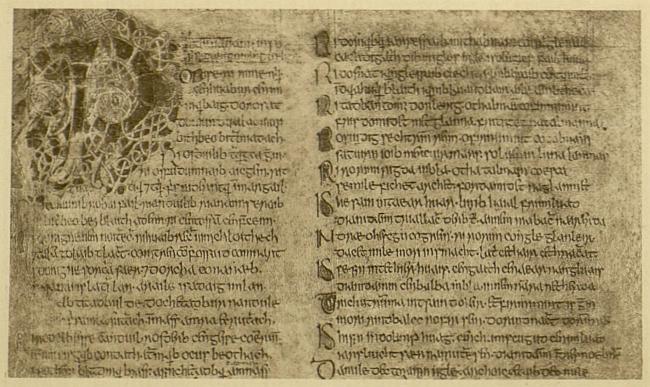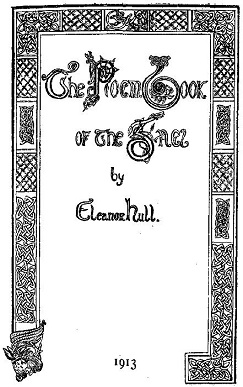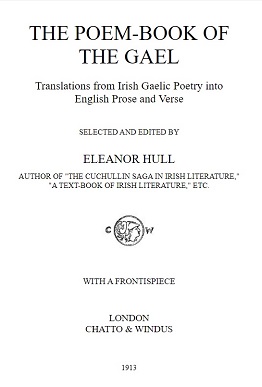Life
[Dame Eleanor Hull], b. 15 Jan., Manchester, England, to Co. Down family, being dg. of Prof. Edward Hull, Dir. of Geological Survey of Ireland, 1870-90; ed. Alexandra College, Dublin; studied under Kuno Meyer and Standish Hayes O’Grady; settled in London and contrib. The Cornhill Magazine; joined London branch of Gaelic League; issued Cuchulain Saga in Irish Literature (1898), 14 stories, it scholarly intro. and notes; followed by Pagan Ireland (1904), and Early Christian Ireland (1905), as part of a 2-vol. Textbook of Irish Literature; fnd., with others, the Irish Texts Society, 1899, and served as secretary for 30 years; sometime President of Irish Literary Society (London); ed. Irish Home Reading Magazine, with Lionel Johnson, 1894; made Dame [date?]; wrote the hymn “Be Thou My Light” based on Mary E. Byrne’s translation of Dallan Forgaill’s Patrician lyric “Rob tu mo bhoile, a Comdi cride”; d. 13 Jan. 1935. JMC IF DIB DIW DIH OCIL FDA
[ See Poembook of the Gael (1912; new imp. 1913) - in RICORSO Library > “Irish Classics” - in frame as .pdf or at Gutenberg Project online. ]
[ top ]
Works
|
|
|
|
Bibliographical details
Cuchulain Saga in Irish Literature, being a collection of stories relating to the hero Cuchullin / translated from the Irish by various scholars, compiled and edited, with introduction and notes, by Eleanor Hull [Grimms Library No. 8] (London: David Nutt 1898), lxxix, 316pp.; CONTENTS: The birth of Conachar, adapted from the translation of K. Meyer; How Conachar gained the kingship over Ulster, adapted from the translation of E. O’Curry; The origin of Cuchullin, from the French translation of M. L. Duvau; Tragical death of the sons of Usnach, from the translations by W. Stokes and O’Flanagan; The wooing of Emer and Cuchullin’s education under Scathach, translated by K. Meyer; The siege of Howth, translated by W. Stokes; The debility of the Ultonian warriors, from the German of E. Windisch; The appearance of the Morrigu to Cuchullin before the Táin Bó Cuailnge, from the German of E. Windisch; The Táin Bó Cuailnge, analysis with extracts by S. H. O’Grady; The instruction of Cuchullin to a prince, from the translations of E. O’Curry and M. D’Arbois de Jubainville; The great defeat on the plain of Muirthemne before Cuchullin’s death, translated by S. H. O’Grady; The tragical death of Cuchullin, translated by W. Stokes; The tragical death of King Conachar, from the translation by E. O’Curry; The phantom chariot of Cuchullin, from the translation by O’Beirne Crowe. [Also facsimile rep., AMS 1972, 316pp.]The Epochs of Irish History: A Textbook of Irish Literature, 2 vols. of which Vol. I: Pagan Ireland (London: D. Nutt 1904], 228pp.; Vol. 2: Early Christian Ireland (London: D. Nutt 1905); jointly as (Dublin: M. H. Gill; London: Alfred Nutt 1906), 306pp.; and Do. [another edn.] (1908).
The Poem-Book of the Gael: Translations from Irish Gaelic Poetry into English Prose and Verse (London: Chatto & Windus 1912) [new impression 1913 - available at Gutenberg Project online]; Do., another edn. (Chicago: Browne & Howell, 1913), 370pp. [available at Google Books online, or in frame as .pdf].
Plate of Saltair na Rann (Bodleian, Rawl. B. 502.) in Hull, Poembook of the Gael (1913) Hull translates successive parts of the Saltair as: I. The Creation of the Universe; II. The Heavenly Kingdom; III. The Forbidden Fruit; IV. The Fall and Expulsion from Paradise; VI. The Penance of Adam and Eve; VI. The Death of Adam. (pp.3-52). [ Read Poembook of the Gael (1913) at Gutenberg Project online, or in frame as .pdf. ] Available at Internet Archive - online; accessed 07.04.2023. CONTENTS - as infra. A full copy of this text can be viewed in her as .pdf or downloaded as .docx.
[ top ]
Criticism
“AE” [George Russell], ‘The Cuchullin Saga’, review of Eleanor Hull, ed., The Cuchullin Saga in Irish Literature (London: Alfred Nutt 1898), in New Ireland Review (January 1899), pp.333-38; Joseph Sweeney, ‘Why “Sinn Féin?”’, in Éire-Ireland, 6, 2 (Summer 1971), pp.33-40 [infra]. See also Irish Book Lover, Vols. 2, 3, 4, 6, 7, 8, & 13.
[ top ]
Commentary
W. P. Ryan, The Irish Literary Revival (London 1894), writes of Miss Eleanor Hull, on the staff of the Literary World, to which she contributes Irish matter; well considered as a lecturer to the Irish Literary Society [116]
Joseph Sweeney, ‘Why “Sinn Féin?”’, in Éire-Ireland, 6, 2 (Summer 1971), pp.33-40: ‘Eleanor Hull, a distinguished Irish scholar of [Douglas] Hyde’s generation feared that [the meaning of the words] Sinn Féin had been widely misunderstood. [...] Sinn Féin’s true meaning of Irish self-reliance, she suggested, could best be understood through the words of a poem by John O’Hagan, written before “the Society which called itself by the name was ever heard of.” (Hull, A History of Ireland and Her People, [1931], p.392; Sweeney, p.37).’ Sweeney quotes the first verse of O’Hagan’s poem ‘The work that should to-day be wrought, / Defer not til to-morrow; / The help that should within be sought / Scorn from without to borrow. / Old maxims these - yet stout and true - / They speak in trumpet tone, / “To do at once what is to do, / And trust Ourselves Alone.”’ (Sweeney, p.38.) Sweeney adds that John O’Hagan became a prominent Justice who edited the collected poems of Samuel Ferguson, published a translation of The Song of Roland, and wrote an introduction to an edition of Thomas More’s Utopia. John O’Leary, who knew him in Paris, said that he was a fine conversationalist. (O’Leary, Recollections of Fenians and Fenianism, 1806, Vol. 2, p.62; Sweeney, p.38.)
[ top ]
Quotations
Sense of Place: ‘[T]here is hardly a bay, a plain, or a hill in Ireland, around which romance, pagan or Christian, has not woven some tale or legend’ (The Cuchullin Saga in Irish Literature, 1898, rep. NY AMS Press 1972, p.xxxiv; quoted in J. W. Foster, Fictions of the Irish Literary Revival, 1987, p.15.) [Foster cites further from this work.]
|
||||||
Epic champions: ‘We see the champions as we can actually conceive them to have lived in an early pre-Christian age. Their barbarities are described without a shade of disgust; their chivalries are the outcome of a natural fairness and fineness of mind, and are not the product of a courtly attention to an exterior code of morals.’ (Text Book, 1906-08, Vol. 1, p.90; quoted in Maria Tymoczko, The Irish Ulysses, California UP 1994, p.310.)
Women in Irish epics: ‘They Irish women belong to an heroic type. They are often thecounsellors of their husbands and the champions of their cause; occasionally, as in Maeve’s case, their masters. They are frequently fierce and vindictive, but they are also strong, forceful, and intelligent. In youth they possess often a charming gaiety; they are full of clever repartee and waywardness and have a delightful and careless self-confidence.’ (Ibid., p.78; Tymoczko, op. cit., p.312.)
[ top ]
References
New English Hymnal (Canterbury Press 1986, and eds. to 1990), incls. 8th-century poem, prob. Irish, trans. by Mary Byrne (1860-1931) and versified by Eleanor Hull (1860-1935): ‘Be thou my vision, O Lord of my Heart / Be all else but naught to me, save that thou art / Be thou my best thought in the day and the night / Both waking and sleeping they presence my light ... Still be my vision whatever befall / Still be thou my vision, O Ruler of All’.
Church of Ireland Hymnal (1960, 1987 edn), incls. “Grusab tú mo bhoile / be thou my vision”, called early Irish [322]; “Baoth a csoidhe, a Mhic Dé”, by Murdock O’Daly [i.e., Muireadach Albanach Ó Dálaigh], 13th c., trans. Eleanor Hull [324]; “Do budh mian dom anmáin-se [My spirit lists]”, trans. from Old Irish [227].
Library of Herbert Bell, Belfast holds A Text Book of Irish Literature, 2 vols. (Dublin [n.d.]); Cuchulain, The Hound of Ulster (London 1911); do., 2nd copy (London n.d.), ill. by Stephen Reid; Edward Hull, The Physical Geology, Geography of Ireland (London 1878).
Belfast Public Library holds under Hull 12 titles; 2 mythology, and 10 geology, incl. Cuchulain, the Hound of Ulster (1911); Early Christian Ireland (1905); History of Ireland and her People (1931); On the Geol. Age of the Ballycastle Coalfield ( [n.d.]); Pagan Ireland (1908); The Physical Geol. and Geog. of Ireland (1891); Poem-Book of the Gael (1912); Reminiscences of a Strenuous Life (1910); A Textbook of Irish Literature (1908); [Hull, pere], Explan. memoir ... [with] sheets 37, 38 and part of 29 of maps of the geol. survey of Ireland (1871).
University of Ulster Library, Morris Collection holds Folklore of the British Isles (1928); A History of Ireland and her People to the Close of the Tudor Period (1926); The Poem Book of the Gael, translation from Gaelic poetry into English prose and verse (1912); A Text Book of Irish Literature, Vol. 1 (Gill 1906).
[ top ]
Notes
W. B. Yeats - : Hull includes Lady Gregory’s poem by Rafterty on Mary Hynes in her Poembook of the Gael (1913) using the same version as the one given by Yeats under the title “Death Hath Closed Helen’s Eye” with the sole difference that she spells the place-name Bailelaoi for his Ballylee. in the editorial note appended to the poem where she cites Lady Gregory as the author, she writes: ‘The title is added by Mr. W. B. Yeats to an article written by him on this poem in The Dome (New Series, vol. iv.). Lady Gregory informs me that Mr. Yeats has slightly worked over her translation.’ (p.323.) Yeats, writing of the transaction in The Celtic Twlight (1893) where he quotes the poem in full, says: ‘The friend that was with me has made some of the translation, but some of it has been made by the country people themselves. I think it has more of the simplicity of the Irish verses than one finds in most translations.’ (Gutenberg Project Edn., online [CT, 1893-1902], p.38-39.) The ‘friend’ is patently Lady Gregory. (See further under Lady Gregory - supra.
Irish Book Lover (July/Aug. 1935), records that Hull was a favourite pupil and close friend of Standish Hayes O’Grady.
Douglas Hyde called Eleanor Hull ‘the most intelligent and best educated girl in Dublin’ in his diary (20 March 1889; see Dominic Daly, Young Douglas Hyde, 1974, n., p.208.)
Namesake?: A certain Vernam E. Hull is the author/ed. of Hessens Irisches Lexikon. Kurzgefasstes / Hessen’s Irish Lexicon [begun by H. Hessen and continued by S. Caomhánach, R. Hertz, V. E. Hull and G. Lehmacher] (Halle 1933- ). Note that Vernam is an English family name but also the name for a ‘perfect cypher‘ employed to encode tele-messages using a separate key for each letter (hence the original of the Enigma Code of the Germans in World War II).
Poembook of the Gael (London: Chatto & Windus 1912, 1913) - Table of Contents
CONTENTS
THE SALTAIR NA RANN, OR PSALTER OF THE VERSES
ANCIENT PAGAN POEMS
[viii]
OSSIANIC POETRY
[ix] EARLY CHRISTIAN POEMS
[x]
POEMS OF THE DARK DAYS
[xi]
RELIGIOUS POEMS OF THE PEOPLE
[xii]
LOVE-SONGS AND POPULAR POETRY
[xiii]
[xiv]
LULLABIES AND WORKING SONGS
[ Full text copy available in RICORSO Library > “Irish Classics” - in frame as .pdf, or at Gutenberg Archive - online. |
[ top ]


